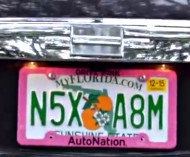4/25/2019
Florida Court Reverses Ban On Anti-Cancer License Plate FramesFlorida Court of Appeal reversed a legal interpretation that allowed police to stop anyone using common license plate frames.

The Florida Court of Appeal on Wednesday lifted a court-imposed ban on license plate frames, including one for a popular charity. The Fort Lauderdale-based car dealership AutoNation has raised $18 million for the Breast Cancer Research Foundation by attaching a pink frame to the vehicles it sells and asking customers to add a contribution of their own.
Last year, the court found a similar frame that partially blocked the phrase "MyFlorida.com" and "Sunshine State" violated a state law forbidding anything from covering the word "Florida" (view case). That ruling, however, was based on the law in effect at the time of the stop in 2015. In 2016, the legislature revised the statute to eliminate special protection for the letters in the word "Florida." Wednesday's case was the first to come before the Court of Appeal since the change.
Dylan Morris was pulled over for having a Drive Pink plate frame on his car, and that lead to his arrest for cocaine possession. Here, however, the court was only interested in the narrow question of whether he should have been pulled over in the first place. The current version of the law states that all the writing on the plate should be "legible at all times 100 feet from the rear or front."
Prosecutors insisted the charity plate frame was illegal because it partially blocked "MyFlorida.com" and "Sunshine State," citing last year's case. The attorneys for Morris fired back that, while some of the letter were somewhat obscured, the words themselves were perfectly legible and consistent with the new law. The appellate judges agreed with the defense.
"Here, all the letters and words on the license plate were visible within 100 feet," Judge Melanie G. May wrote for the three-judge panel. "In fact, the officer who stopped the defendant testified in deposition that 'he didn't have any trouble' reading the word 'Florida.' The trial court specifically found that 'everything that needs to be identified is identifiable,' even with the frame."
Since the meaning of the statute is clear from its words, and the Drive Pink plate frame meets all the guidelines, the court found that Morris never should have been pulled over in the first place. Because prosecutors made a procedural mistake, the court declined to apply the Heien precedent that would have upheld the stop under the prior interpretation of the law.
A copy of the ruling is available in a 200k PDF file at the source link below.


